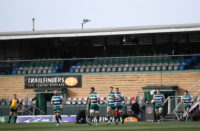 There's been a marked reluctance in English rugby ranks to accept that the 2015 Rugby World Cup draw is by far the biggest banana skin to have been thrown in the path of a host nation since the tournament's inception 25 years ago. However, England's record 30–3 trouncing by the Welsh at the Millennium Stadium last weekend was a timely alarm call, emphasising just how hard they could fall if they get it wrong again in their Pool A scrap for survival with Australia and Wales.
There's been a marked reluctance in English rugby ranks to accept that the 2015 Rugby World Cup draw is by far the biggest banana skin to have been thrown in the path of a host nation since the tournament's inception 25 years ago. However, England's record 30–3 trouncing by the Welsh at the Millennium Stadium last weekend was a timely alarm call, emphasising just how hard they could fall if they get it wrong again in their Pool A scrap for survival with Australia and Wales.
In the six World Cups so far no host nation has failed to progress to the last eight, but there is a realistic chance that England could be the first fall guys – and they have only themselves to blame because they knew, going into the summer and autumn internationals, that they could not leave anything to chance.
Two wins from the five Tests against South Africa and Australia would probably have carried Stuart Lancaster's team clear of the danger zone, rather than make them hostage to the autumn slump of the Welsh, or France's more forgiving fixture list.
The only nation with real cause for complaint were Australia, because they were caught in the three way tangle despite finishing second in the IRB rankings. The upside for the Wallabies is that their record against their British rivals gives them good cause for optimism. Wales have not beaten Australia in their last eight attempts, while England have lost four Tests out of six against Australia since 2007, including losing to a depleted Wallaby side at Twickenham in the autumn.
Take into account that Wales have just given England an almighty pasting – their third successive win in the fixture – and the pecking order two and a half years out from the World Cup is crystal clear: 1. Australia. 2. Wales. 3. England.
The multi-million pound question is whether that pecking order will change enough to enable England not only to qualify for the knock-out stages, but also to stand a good chance of winning the tournament for the second time in its history. In the meantime, England have taken a blow to the solar plexus which has left them stunned and hurt, and which might have serious ramifications in terms of confidence and form.
That applies to coaches as well as players, because the overwhelming superiority of the Welsh underlines that England's strategy ahead of the Cardiff showdown was lacking in key areas, with selection and preparation most in question.
TIME FOR AN OVERHAUL
The curtain has come down on Lancaster's first phase as England head coach with a thud, and he should embark on a second phase in which he overhauls the current squad as diligently as he did when he first took over. This has to include building a more powerful pack, finding a genuine openside flanker, and tuning-up his attack by introducing backs with creativity and pace.
The England head coach has said that he does not forsee wholesale changes to his 64 man EPS squad ahead of the 2015 World Cup, but he is too inflexible about bringing form players into the camp, and returning others to their clubs. Furthermore, if Lancaster needed any reminding that there are ways and means of bringing in French-domiciled players without any detrimental effects then he need only to look at the outstanding performances of Mike Phillips and Gethin Jenkins for Wales last Saturday evening.
It would be worth him pondering whether England might have got considerably closer to the Welsh had they done the same with Andrew Sheridan and Steffon Armitage. Ruling out a loosehead of Sheridan's calibre this season was a mistake, and hard to justify given the lesson handed out to Joe Marler and Mako Vunipola by Adam Jones.
What will do the most good for English rugby? Being a stickler for the fine print about squad quotas and protocols, or getting your best possible Test players, like Sheridan, on the pitch and winning Grand Slams?
Lancaster's job description is simple: to win every competition England take part in. This involves recognising that in international rugby it is a complete waste of time to talk about a young team on a learning curve. No-one cares. Test rugby is not a nursery, and, whether a player is young or old, has two caps or 100, the only requirement is that he is equipped to do the job.
What we discovered in Cardiff is that some of Lancaster's team are works in progress who will struggle to be world champion contenders two years from now.
Lancaster compared last weekend's rout in Cardiff to England's surprise autumn victory over New Zealand, implying that fluctuation in form is just one of the hazards of international rugby. I disagree.
Although New Zealand went behind at Twickenham in much the same way as England did against Wales, trailing 15-3 early in the second half, the All Blacks still had the firepower to score two tries in quick succession at the start of the second half to leave the match on a knife edge. England's response to it was spectacular, and earned a famous scalp.
The Grand Slam attempt was never on a knife edge because the try-scoring prowess England showed against the All Blacks had become a distant memory by the time they ran onto the Millennium pitch. It was keenly fought for the first half-hour, but the momentum was moving inexorably to the Welsh, and too much has been made of England's fleeting chances.
Slow motion replays led some pundits to say that if Manu Tuilagi had caught Owen Farrell's pass England would probably have scored with the match in its infancy. Given the effectiveness of the Welsh defence, head-on and scrambling, the evidence was not conclusive. Tuilagi was thinking crash-ball, and there was a good chance in any case that Alex Cuthbert would have tackled the England No.13 before he could get a pass away.
Later on, Tuilagi was guilty of ignoring a three-on-one on the edge of the Welsh 22. But, again, there was nothing about England's ponderous attack to suggest that they would have scored, and plenty about the steel-trap Welsh defence to suggest that they would have been stopped. After the break Farrell also kicked with a four man overlap outside him, but England were 70 metres out.
Apart from that, the only prospect of an England try was when Toby Flood was given a bit of leeway in the closing minutes as the Welsh slackened off with the Championship already in the bag. Even then the replacement fly-half was a couple of feet short.
ATTACK, ATTACK, ATTACK!
The reality is that England were deficient in attack against Wales, and the warning signs had been there since the game against France. It would be wrong to use hindsight to rewrite history. There were some exhilerating tries against Scotland, and England showed great spirit and, at times, tactical nous in the Dublin storm. There were also good things in the way England toughed it out against the French — but by then the balance between defence and attack looked lop-sided.
Where Lancaster, Andy Farrell, Graham Rowntree and Mike Catt came unstuck was not recognising it soon enough. If you want to play a marauding New Zealand style game, intensity at the breakdown and pressure defence are the main pre-requisites – but they will not deliver the big prizes if they are your only attributes.
For instance, New Zealand have a very effective set-piece and a great counter-attacking back three. England were deficient in both areas long before they got to Cardiff.
Other than against Scotland, the English scrum had been inconsistent and was frequently under pressure on both sides of the front row. Lancaster's back three was unbalanced. While the experiment of two full-backs against a kick-chase orientated side like South Africa made sense, carrying it over to the Six Nations did not, and having Alex Goode and Mike Brown in the side for their kicking was a luxury England's attack could not afford.
The favoured status accorded to Chris Ashton was also difficult to understand, as we highlighted three weeks ago. Ashton's kick-chase against the Irish lacked conviction, and his missed tackles and positional errors against France should have seen him dropped to the bench against Italy in favour of an in-form wing, with Christian Wade and Jonny May champing at the bit. Instead, Ashton was retained against Italy and Wales, dropped off a few more tackles, and was ineffective again.
England became a one-trick pony during the Six Nations, relying on breakdown supremacy, and having watched the Irish, French and Italians disrupt their forwards at scrum and lineout, Wales knew exactly what to target.
Their total dominance at the set-piece led to all things, including Cuthbert's two tries and rich pickings for Justin Tipuric and Sam Warburton.
WHAT NEXT?
1. Build a Power Pack
England's front five is mobile but underpowered against the big beasts fielded by teams like Wales, South Africa, and a full-strength Australia. The scrum is not solid on its own put-in, or disruptive on the opposition's, and the lineout return was the lowest in the tournament. Mako Vunipola has to get fitter, and they need another tighthead to challenge Dan Cole, who was rarely dominant. Lancaster has to find a Bakkies Botha-style big unit like Dave Attwood, to pack alongside either Joe Launchbury, or Geoff Parling, or Courtney Lawes. A pairing of two athlete locks has helped England's breakdown, but leaves them light in the tight.
2. Find a True No.7
Like everyone, Lancaster has great regard for Chris Robshaw, but England must fast-track a horrible, quick, streetwise No.7 for 2015 before it's too late. The Six Nations captain cannot be faulted for attitude, commitment, work-rate, tackle-count, or a good pair of hands. But the Test arena is ruthless, and the evidence from Cardiff is that Robshaw must fight it out with Tom Wood and Tom Croft for the No.6 shirt. Robshaw is not a destructive ball-winning fetcher, and, even though the English forwards were on the back foot, he does not have the speed to do what Justin Tipuric does for Wales.
3. Pick backs with Pace
Brad Barritt is the Robshaw of the backline, but picking him in a line-up which also includes his Saracens buddies Owen Farrell and Alex Goode, leaves England short of pace and creativity. Nor is Barritt a foil for similarly crash-bang Manu Tuilagi. After impressing against the Scots, Billy Twelvetrees deserved another start against Italy to see if he could provide a spark inside Tuilagi, freeing him from the burden of being England's sole attacking carrier. A back three containing two full-backs, neither of whom are wing-fast, compounds the lack of Cuthbert-style strike speed, and there was a strong case for May and Wade coming in for Ashton and Goode well before the second-half debacle unfolded at the Millennium Stadium.
2 Comments
Leave a Comment
You must be logged in to post a comment.



























Pingback: look at here
Pingback: ราคาบอลวันนี้